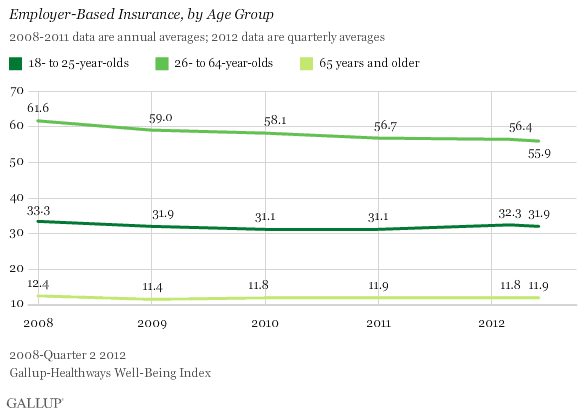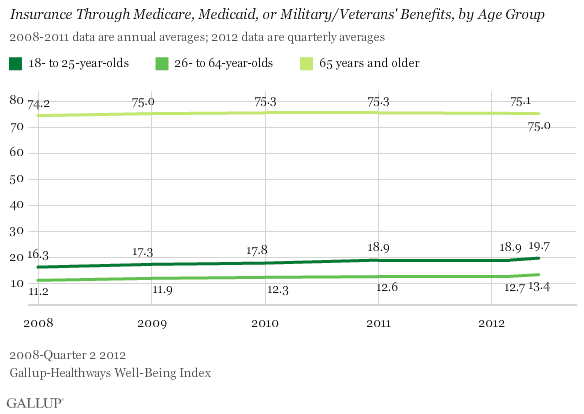WASHINGTON, D.C. -- Fewer U.S. adults aged 26 to 64 are getting health insurance from an employer in 2012, continuing a downward trend that began in 2008. The 55.9% who reported having it in the second quarter of 2012 is down from 56.7% in 2011 and is the lowest Gallup has found since 2008. At the same time, the percentage of 18- to 25-year-olds with employer-based insurance -- which also initially declined in 2008 and 2009 -- has since stabilized and appears to even up so far in 2012.

The slight uptick from 2011 to 2012 in employer-based insurance among 18- to 25-year-olds comes as the uninsured rate for that age group continues to decrease. Young adults have become less likely to be uninsured since the fall of 2010, when the provision of the healthcare law that allows them to stay on their parents' plans until age 26 went into effect.
The percentage of all American adults with employer-based health insurance was 44.2% in the second quarter of 2012, a figure which has generally decreased since 2008. However, government-based health insurance -- Medicare, Medicaid, and military/veterans' benefits - is at 25.7% in the second quarter of 2012, and is still much higher than it was in 2008 and 2009.
The increase in government health insurance is evident among 18- to 25-year-olds and 26- to 64-year-olds. In the second quarter of 2012, 19.7% of adults aged 18 to 25 said they get their health coverage from a government program, up from 18.9% in 2011, and much higher than the 16.3% who said the same in 2008.
Similarly, the 13.4% of 26- to 64-year-olds who reported having government-based health insurance last quarter is up from 12.6% in 2011 and is higher than the 11.2% in 2008.
However, Americans aged 65 and older -- nearly all of whom qualify for Medicare -- are just as likely to report government health insurance now as they have been since 2008.

It is unclear at this point why more adults aged 18 to 25 are reporting government-based health insurance. It may be related to the high unemployment rate among this age group.
Bottom Line
Despite the U.S. Supreme Court's ruling last Thursday to uphold the 2010 healthcare law, House Republican leaders are planning to vote on a repeal bill this month and Mitt Romney has pledged to repeal the law on day one if he is elected president. The law and its effects on health insurance companies, employers, and American citizens will surely continue to be a political and media talking point for months and years to come. This will be especially true as the major components of the legislation -- including the individual mandate and the health insurance exchanges -- take effect in 2014.
It is clear, though, that one part of the law -- the piece allowing those up to age 26 to stay on their parents' plans -- has already had a significant effect. More 18- to 25-year-olds have gained health insurance -- and through an employer in particular. Those who are older, though, have become more likely to be uninsured -- mainly due to fewer reporting that they are getting insurance from an employer.
About the Gallup-Healthways Well-Being Index
The Gallup-Healthways Well-Being Index tracks well-being in the U.S., U.K., and Germany and provides best-in-class solutions for a healthier world. To learn more, please visit well-beingindex.com.
Survey Methods
Results are based on telephone interviews conducted as part of the Gallup-Healthways Well-Being Index survey April 1-June 30, 2012, with a random sample of 87,521 adults, aged 18 and older, living in all 50 U.S. states and the District of Columbia, selected using random-digit-dial sampling.
For results based on the total sample of national adults for each reported age group, one can say with 95% confidence that the maximum margin of sampling error is ±1.0 percentage point.
Interviews are conducted with respondents on landline telephones and cellular phones, with interviews conducted in Spanish for respondents who are primarily Spanish-speaking. Each sample includes a minimum quota of 400 cell phone respondents and 600 landline respondents per 1,000 national adults, with additional minimum quotas among landline respondents by region. Landline telephone numbers are chosen at random among listed telephone numbers. Cell phone numbers are selected using random-digit-dial methods. Landline respondents are chosen at random within each household on the basis of which member had the most recent birthday.
Samples are weighted by gender, age, race, Hispanic ethnicity, education, region, adults in the household, and phone status (cell phone only/landline only/both, cell phone mostly, and having an unlisted landline number). Demographic weighting targets are based on the March 2011 Current Population Survey figures for the aged 18 and older non-institutionalized population living in U.S. telephone households. All reported margins of sampling error include the computed design effects for weighting and sample design.
In addition to sampling error, question wording and practical difficulties in conducting surveys can introduce error or bias into the findings of public opinion polls.
For more details on Gallup's polling methodology, visit www.gallup.com.In addition to sampling error, question wording and practical difficulties in conducting surveys can introduce error or bias into the findings of public opinion polls.
[Polls conducted entirely in one day, such as this one, are subject to additional error or bias not found in polls conducted over several days.]
For more details on Gallup's polling methodology, visit www.gallup.com.
